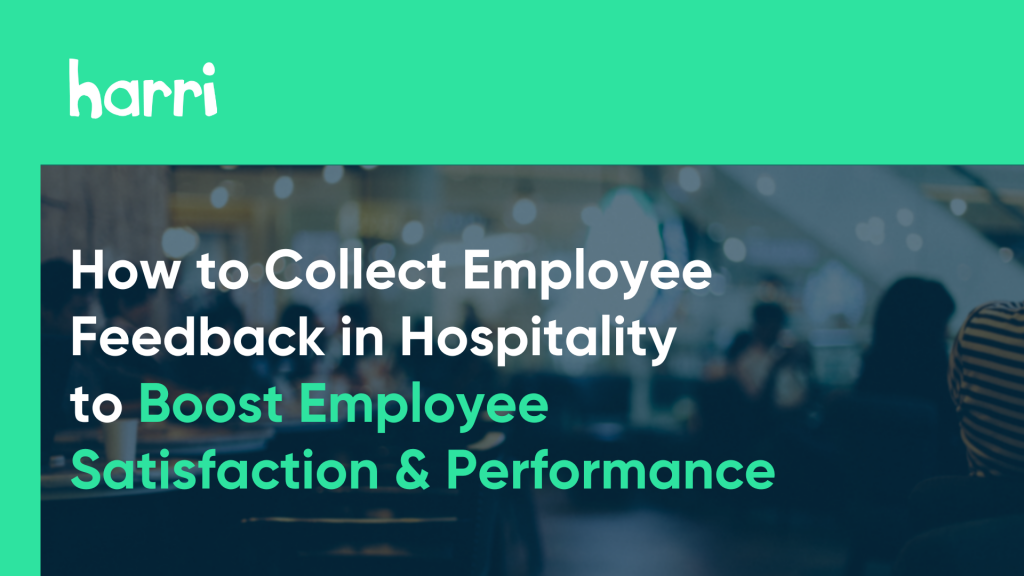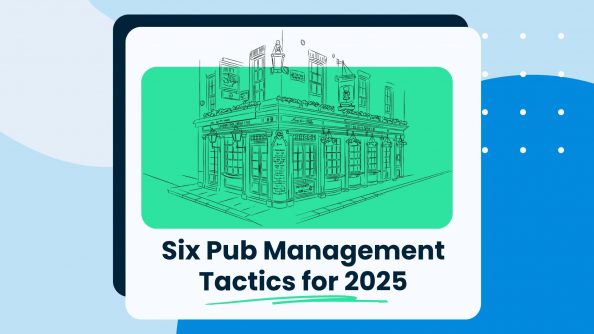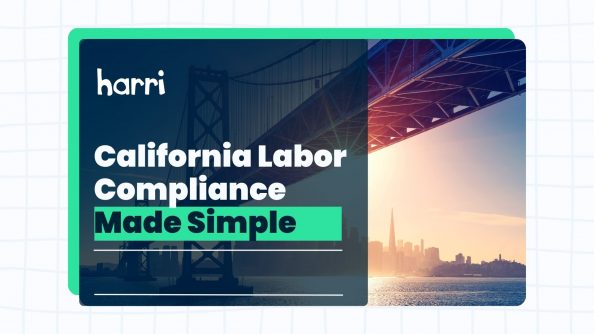How to Collect Employee Feedback in Hospitality to Boost Employee Satisfaction and Performance

- By Harri Insider Team | May 23, 2024
Frontline employees are closest to the action and can provide valuable feedback that can make or break a business. The challenge lies in getting employees to provide it. Perhaps employees are comfortable providing feedback, but it might not reach someone who can implement change. Worse, employees might not be comfortable sharing feedback at all and sit in silence.
Receiving feedback from any employee is a gift. Operators who act on feedback benefit from happier employees working in better conditions. Happy employees are more productive overall, empowered to provide a strong guest experience, and ultimately, improve your bottom line.
Engage Employees to Create a Culture of Trust and Feedback
Engaging frontline employees to provide feedback requires creating an environment of trust and accessibility. Create a safe environment by encouraging an open-door policy for staff to share their thoughts. Find ways to make it simple for employees to share without asking them to take on a huge administrative load.
Harri takes advantage of the everyday action of clocking in and out to effortlessly collect feedback. It starts right at the time clock, engaging employees from the get-go. Other options to engage employees for feedback continue seamlessly through Harri’s communications portal. This portal, which employees already use to check their pay stubs and other functions, allows them to share detailed feedback without interrupting their workday.
Collecting diverse feedback from hospitality employees enables operators to uncover hidden insights that can drive significant improvements. And, since frontline employees are a wealth of information, there is no shortage of what types of feedback you can ask for.

Types of Employee Feedback to Collect in Hospitality
Scheduling Issues
Why It Matters
Collecting feedback about scheduling ensures that employees are satisfied with their work hours and helps identify any issues affecting job satisfaction and retention.
Use Case Example
When monitoring key metrics for a store, one employee indicated a very low score for job satisfaction and mentioned, “Management is okay, it would be better if they listened to our scheduling availability better.” The manager followed up, discovered that the employee’s availability had changed, and adjusted the schedule to provide more hours, resulting in increased employee satisfaction.
Sample Questions to Ask
- “Are you receiving the number of hours you expected each week?”
- “Do you feel your current schedule allows for a good work-life balance?”
- “Is there anything we can do to improve your scheduling?”
Benefits
- Improved employee satisfaction
- Reduced turnover
- Enhanced scheduling efficiency
Career Progression
Why It Matters
Understanding employees’ career ambitions helps identify opportunities to promote high-performing team members, fostering loyalty and growth within the company.
Use Case Example
One beta client implemented touchpoints tailored by job role to ask team members about their desire to progress. This uncovered hidden talent and aspirations, ensuring that team members felt heard and valued.
Sample Question to Ask Employees
- “Do you see opportunities for career advancement within our company?”
- “What skills or training would help you achieve your career goals?”
- “How satisfied are you with the current opportunities for career progression?”
Benefits
- Increased employee retention
- Identification of potential leaders
- Enhanced employee engagement
Manager Feedback
Why It Matters
Gathering insights on manager performance helps pinpoint and address issues at specific locations, improving overall management effectiveness.
Use Case Example
A large franchisee group built a framework to tie touchpoints to critical categories, creating a scorecard to monitor trends and performance in communication and culture for their general managers.
Sample Questions to Ask
- “How would you rate the communication from your general manager?”
- “How often does your manager provide constructive feedback?”
- “Do you feel comfortable approaching your manager with concerns?”
Benefits
- Improved management practices
- Enhanced employee-manager relationships
- Better workplace communication
Menu Ideas and Feedback
Why It Matters
Collecting feedback on menu items allows frontline teams to share their ideas and suggestions, leading to improved offerings and increased customer satisfaction.
Use Case Example
Several beta clients used touchpoints to create forums for their frontline teams to share menu feedback and ideas.
Sample Questions to Ask
- “What menu items do you think should be improved or removed?”
- “Do you have any new menu ideas that you believe our customers would love?”
- “How do customers typically react to our current menu items?”
Benefits
- Innovation in menu offerings
- Increased customer satisfaction
- Employee involvement in decision-making
Operational Challenges
Why It Matters
Feedback on operational challenges helps identify and address issues that may lead to job dissatisfaction and affect overall efficiency.
Use Case Example
An employee reported, “It could have been better. We had no degreaser and very few mops among other things.” This kind of feedback allows operators to quickly address and resolve operational issues.
Sample Questions to Ask
- “Are there any tools or resources that you need to do your job effectively?”
- “What operational challenges do you face regularly?”
- “How can we improve the efficiency of your daily tasks?”
Benefits
- Improved operational efficiency
- Enhanced job satisfaction
- Reduced operational bottlenecks
Location-Specific Issues
Why It Matters
Collecting feedback about specific managers or locations helps operators identify and address localized problems that might affect employee satisfaction and performance.
Use Case Example
An employee mentioned, “The manager never had me properly trained, and I don’t get any hours to work. The location I work at is chaos. No structure, no communication.” The manager quickly moved the employee to a different restaurant, where the employee had a much better experience.
Sample Questions to Ask
- “Do you feel adequately trained for your role?”
- “How would you rate the communication at your current location?”
- “Is there anything specific that would improve your experience at this location?”
Benefits
- Improved training practices
- Better communication at specific locations
- Enhanced employee satisfaction
New Hire Feedback
Why It Matters
The first 90 days of employment are crucial for both the employee and the employer. This period is often where new hires decide if they see a future with the company. By collecting feedback during this time, operators can identify and address issues early, reduce turnover, and create a supportive environment that encourages new hires to stay and grow. Structured feedback during this critical period helps identify and resolve potential issues early, ensuring a smoother transition and greater job satisfaction for new employees.
Sample Questions to Ask
- “How was your first day? Were you welcomed and made to feel part of the team?”
- “What challenges have you faced in your first month?”
- “Are there any aspects of the job that you find particularly difficult or frustrating?”
Benefits
- Reduced early turnover/Increased long-term retention
- Enhanced employee support and satisfaction
- Improved onboarding process
By leveraging structured feedback mechanisms, operators can uncover hidden insights, address issues early, and foster a culture of continuous improvement. Each type of feedback provides valuable information that can enhance employee satisfaction and boost overall performance. By making feedback collection an integral part of daily operations, hospitality operators will be empowered to meet the needs of their employees, ultimately leading to a better employee and guest experience.
See How Harri can Help Boost Your Staff Engagement

Cultivating a robust feedback culture within the hospitality industry is can foster employee satisfaction, help to reduce turnover, and enhance overall performance. By integrating seamless and effective feedback mechanisms, operators can tap into the wealth of insights provided by frontline employees. This not only improves working conditions but also empowers employees to deliver exceptional guest experiences. By prioritizing employee engagement and making feedback a cornerstone of your business strategy, you ensure a thriving, motivated workforce that is essential for sustained success in the hospitality industry. Learn more about how Harri can help you do this today.





















